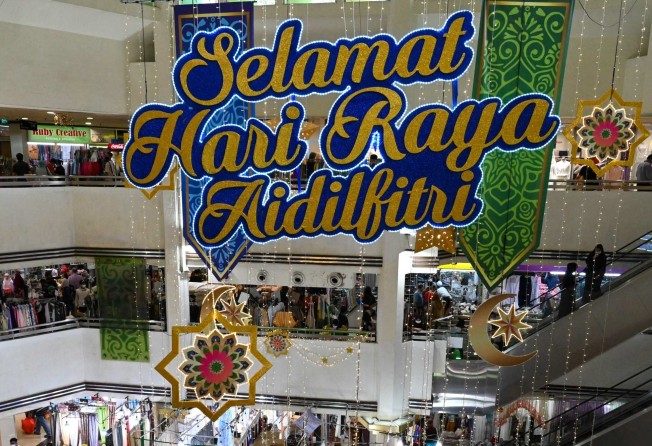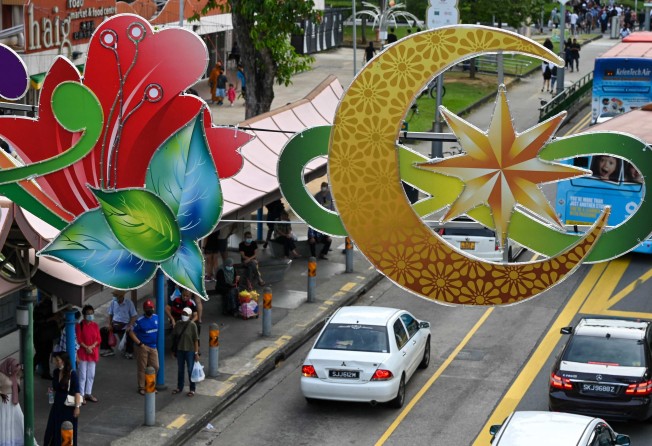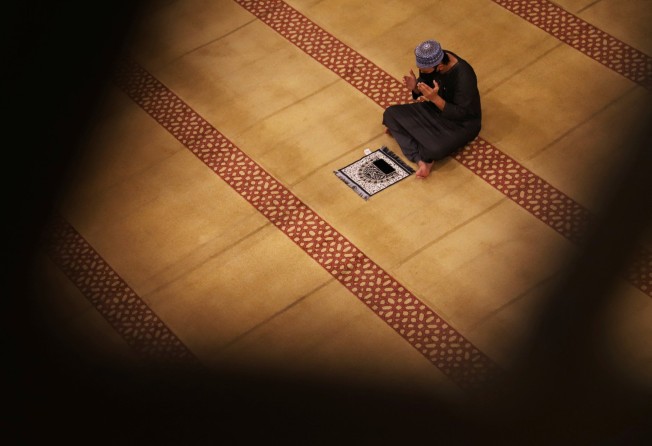
‘Lively and special’: Singapore’s Muslims cheer first Eid without Covid curbing festivities
- Mosques are once again bustling and family gatherings have returned at full scale for this year’s Hari Raya Aidilfitri, or Eid al-Fitr, in Singapore
- Last month the city state lifted social-distancing curbs and capacity limits on venues that had led to two years of smaller-scale celebrations

Roslaini Husain, 61, is excited. After two years of quieter, smaller festivities amid the pandemic, she can finally host the Eid al-Fitr celebrations that she used to, with up to 30 guests feasting on her home-cooked dishes.
The Singaporean housewife and mother of four is looking forward to welcoming her relatives and friends on Tuesday. “I have bought a lot of fresh flowers, decorated my house, put up fairy lights, put out cookies and cake,” she said. “This year we can have as many guests as we want.”
Almost 16 per cent of Singapore’s 4 million citizens and permanent residents are Muslims, who celebrate Eid – known in Malay as Hari Raya Aidilfitri – to mark the end of the Islamic fasting month of Ramadan.
The festival is also a highlight for Bangladeshi Muslims in Singapore, who make up a sizeable proportion of the country’s more than 300,000 migrant workers.

Hari Raya means “grand day of rejoicing” in Malay, but over the past two years social-distancing curbs have muted celebrations. Singapore’s circuit-breaker lockdown in 2020 banned gatherings outright, while households were limited to just five visitors a day during last year’s festival.
Last month, however, the city state removed limits on group sizes entirely in its most significant easing of Covid-19 curbs yet – a move that was greeted with cheers by the city state’s Muslim community.
“With the easing of Covid-19 restrictions, this year’s Raya indeed feels lively and special,” Prime Minister Lee Hsien Loong wrote in a Facebook post. “For the first time since the pandemic started, our Muslim friends are able to resume more normalcy, and gather with family and friends to celebrate the end of the fasting month.”
For Yusyafiqah Yusoff this meant her family of 11 could celebrate the festival together again in person, with no more drawing up schedules and allocating time slots for house visits.
“I’m truly looking forward to everyone finally being able to meet at one spot at the same time. We can finally celebrate Hari Raya the way it used to be,” the 27-year-old said.
Two years of smaller-scale celebrations had almost made her forget how tiring the lead-up to the festival could be, Yusyafiqah said. “The amount of cleaning, preparation, and cooking that needs to be done is insane.”
She usually helps her mother prepare several traditional dishes, including ayam masak merah (chicken in spicy tomato sauce), sambal udang (fried chilli shrimp), and sambal goreng (stir-fried chilli tofu, tempeh and beans).

“Despite it being a tiring one, I do enjoy the entire process as it allows me to spend time with my parents while doing these things and we felt a sense of achievement once all of it is done,” Yusyafiqah said.
Last month’s easing of restrictions also allowed families to once again pray in mosques together, which Syafiq Shahiddin said had been “rather difficult” during the pandemic as quotas were imposed on the number of people that could enter.
His family has a long tradition of breaking fast together before heading to the mosque for prayers, he said, so it was refreshing to be able to do that again.
The 29-year-old product manager, whose extended family has more than 50 members, is also excited about seeing some relatives again for the first time since the start of the pandemic. He said he has been cleaning and tidying his house in preparation.
Muslims follow a lunar calendar, and methodologies, including moon sighting, can lead to different countries – or Muslim communities – declaring the start of Eid on different days.
Malaysia, Indonesia and Brunei kicked off their celebrations on Monday after religious authorities there announced moon sightings on Sunday evening, but Singapore had to wait until Tuesday to mark the occasion – alongside Bangladesh and India.
Singapore Mufti Nazirudin Mohd Nasir said the crescent moon – which traditionally marks the start of a new month in the Islamic calendar – could not be seen from the city state after sunset on Sunday evening.
Singapore’s Office of the Mufti wrote on Instagram that it was generally “extremely difficult” for the crescent moon to be seen from the city state because it was often cloudy and that “differences in the determination of the Islamic calendar is something which is neither unexpected nor alarming”. It shared a quote from the Prophet that said: “If [the crescent moon] is obscured from you, then regard the month of Ramadan as 30 days.”
Still, Malaysia’s decision to go ahead with Hari Raya Aidilfitri celebrations on Monday took some in the country by surprise, with reports of people dashing to shops on Sunday night to buy last-minute groceries and clothes.